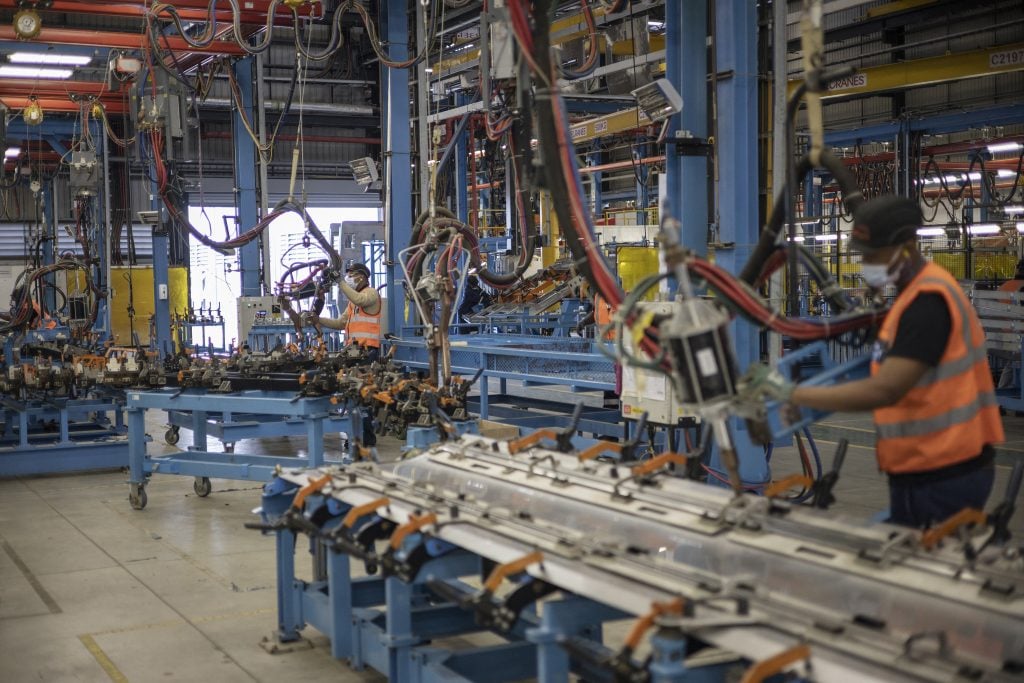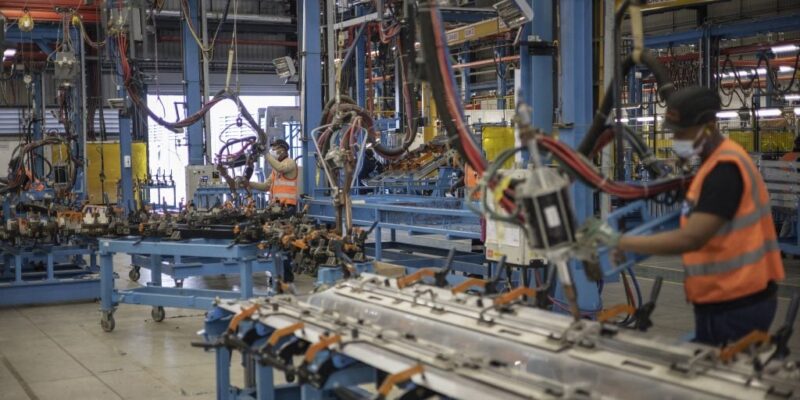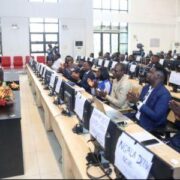
Zain Verjee, an executive fellow at the Digital Data and Design Institute at Harvard University, is co-founder of an AI and communications consultancy, and hosts the podcast series Embedded. She talks to Omar Ben Yedder about the future of AI and technology adoption in Africa, two of the key themes of this year’s World Economic Forum in Davos.
You’ve immersed yourself in AI and crypto this last year. What have you discovered? What has surprised you, in a positive and also worrying way?
I have tried to make learning a theme this year. I have tried to immerse myself in actually participating in the use of AI technology and tools and participating in crypto. I try to learn at least one percent of something a day. And I give myself small wins and permission to get the basics and then build from there.
I don’t need to be a total expert in everything but if I can cross a threshold of 30 percent, then I’m in good shape. I also think as a woman, we tend to be intimidated in general with technology if that is not our discipline. And I’m trying to break down those barriers because if I can understand it and absorb and immerse myself in new technologies, then all other women can too.
I’ve learned that AI is here to stay and that people who don’t use AI will be replaced with people who do. It’s that simple. And in my field, communications, I do think that it has been disrupted as a very first sector and it continues to be disrupted…in writing, in creativity, in content, in production, editing, creativity, filmmaking, producing, all of this is being disrupted very fast. And the playing field has been levelled.
I’m optimistic that innovation will make lives easier, make us smarter and enable us to do things faster. I don’t have rose-tinted glasses in the sense that I think there’s a long way to go with artificial intelligence and innovation, ensuring ethics are at the core of everything and datasets that address the issues around bias are addressed. There are also legal and regulatory issues that need to be addressed.
I think what surprised me is that skills like writing, linguistics and the ability to understand as humans what empathy and emotions are, are actually more important skills than just learning to code and taking a class on machine learning. I think that these human skills are going to become absolutely critical as AI progresses.
Are you seeing the continent embracing new technologies or are we going to be left behind, especially given the massive financial resources that are needed to ‘win’ the AI race?
I’m very bullish on the continent. We are not passive. We recently had a Bitcoin Africa crypto conference. We have people looking at creating stable coins, looking at many use cases around Africa and blockchains. I’ve bought a lot of NFTs that have been created from African talent. So no, we are very active, but we are active in pockets.
I think there is a really steep learning curve and access to knowledge and information that we need to create and make accessible when it comes to crypto in Africa. I think there are a lot of people innovating around AI for specific African use cases that are African led and very importantly, language focused, dataset focused. We are looking at building small language models across the continent and we understand our diversity and therefore the diversity required in datasets.
There are cultural nuances that people are doing a lot of work around. How do you integrate that into AI and into datasets that can be retrieved appropriately and accurately? I’ve made a strong case for owning our datasets. We understand what happened during colonisation and we don’t want a situation where our resource – now our data – is sold to the West only to have the West package it and research it, experiment with it, refine it and then [they] sell it back to us as a product at a [higher] price. So I think that it’s important to understand how to manage your data and data sovereignty.
We have to be able to build the infrastructure for us to be able to support our AI ecosystem – data centres run from renewable energy – and I think the more we learn new skills as a continent and as a people the better.
There is talent [on the continent]. There are coders and creators and product managers and design people and engineers that are here but need the opportunities.
We also or use well enough. We should build those bridges and learn from them and they equally have an opportunity on the continent to immerse in [developing solutions in] agriculture or health and truly transformational sectors that can help the continent.
And let not us be afraid of the profit motive. We want to build a business ecosystem and a marketplace where our creators can earn money and survive in new industries. Our leaders need to encourage innovation and they need to open ecosystems and not over-regulate.
Throughout your career, you have specialised in the media space, trying to change the narrative of the continent, but AI risks perpetuating prejudices associated with the continent. How can AI be a force of good, especially with such little coverage of Africa?
The answer here lies in creating our own datasets and in producing and structuring and labelling our own datasets that are authentically African. I’ve spent a lot of time since leaving CNN talking about how we need to own our own stories. We need to tell powerful stories of the continent that are truly diverse. And we need to build a market around media and storytelling on the continent.
The principle hasn’t changed, but because technology has, our lens needs to change and we need to play where the game is at and we need to play where the puck is going. And the puck is going very clearly down technology and down a route of fast paced artificial intelligence development. And datasets are at the core of that.
Maybe we don’t have the capacity right now to compete with Google’s Gemini or Meta’s Llama or Anthropic’s Claude or OpenAI’s GPT, but we can find innovative ways and work on small language models and find ecosystems that work for us.
Our leaders need to do a better job, frankly, of creating learning ecosystems for our young people and creating new types of jobs. You don’t want to regulate before you innovate. Let the innovation happen.
And very importantly to me, I don’t want women or girls to be left behind or the whole gender gap to deepen around technology either. We have got to break down those barriers. We need to immerse more women in technology. We need to invest in them.
What are the key ingredients missing in Africa that are holding it back [in AI]?
There’s so much. The starting point: the infrastructure fundamentals. We don’t have reliable electricity. That’s a problem. We have limited broadband and internet penetration. That’s a problem. We have high data costs. That’s a problem. We have lousy infrastructure, roads and logistics and all of that necessary to support technology and the essential aspects of distribution and being networked to one another. We don’t have data centres. We also have limited skill sets. That’s all a reality. But it’s not an obstacle.
So now what? The human capital and education pipeline is really a serious one. There’s a gap between what we’re learning right now on the continent and how skill sets are rapidly being developed. And I think there’s an opportunity for leaders on the continent to start looking at this ourselves and not wait to be told by Google or some international foundations what we ought to be doing.
We need to be creating technical training opportunities like AI and robotics. Widespread digital literacy at all levels.
There’s not enough risk being taken on the continent. There’s an underdeveloped VC ecosystem. We like saying Silicon Savannah, but it’s not there. We need a real capital ecosystem to truly build our industries, especially things like creative cultural industries, which is close to my heart.
We need to be able to train systems that produce African images, African video. I don’t need to only be using Sora and Midjourney. If I ecreate an image of a Kenyan, I get a black person. But I know that Kenyans look different from Nigerians and Ethiopians and Rwandans. But the prompts don’t catch that because they’ve been trained by Westerners on Western data sets and the Western perception of what it is to be a black person.
I’ve talked about regulatory environments that can deter innovation. And there’s different regulations across different countries. And even though we like to talk about our regional opportunities, we tend to fight each other. The big economic opportunities are there as a region.
I also don’t think there’s strong enough IP protection on the continent for innovators and product managers and people that want to develop products. Imported solutions from the West don’t adequately address our problems and our challenges. But then those are the solutions that come in. So that’s what we use. And that’s a problem.
We really need to focus on building products that solve Africa specific problems which also means we need multidisciplinary product labs.
This theme is Davos Collaboration is the New Intelligent Age. Do you see greater collaboration or division between rich and poor?
Is Davos just a lot of private jets with a large carbon footprint? Davos doesn’t understand that the insulated rich talking about the poor is over. That is inequity.
AI is a great equaliser. So I think that there’s an opportunity to explore how you equalise rich and poor with AI. AI democratises access to knowledge and tools for those that have connectivity.
There are open-source models and data sets that are enabling collaborative research and development. And that’s good. Lambda 3 is a good example.
I think policy choices and international regulation and ethics and frameworks will probably be debated in Davos. That’s all important. If I were to just pick one thing that I care about the most, I think it’s really trying to fill that knowledge gap between populations that are AI-enabled and populations that are AI-limited, and that could widen quickly. We have to shift the dynamics of power.









Comments